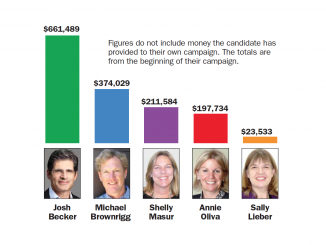
BY SARA TABIN
Daily Post Staff Writer
The Daily Post interviewed the six candidates running for three seats on the Palo Alto school board.
Katie Causey
Eight years after graduating from Palo Alto High School, Katie Causey is making a bid for the Palo Alto school board.
Causey, 26, said she has wanted to run for a seat on the board since she was 15. At that time the district was suffering from a cluster of suicides and the national recession.
She attended George Washington University where she focused on school policies surrounding Title IX, which bars discrimination based on gender, as part of her woman’s studies major.
She said she isn’t surprised that Palo Alto has had Title IX problems in recent years stemming from instances of sexual misconduct on school campuses.
“I remember being in the district when Title IX wasn’t enforced,” she said.
Now there are more resources for Title IX issues, she said. But Causey said she thinks the district could see Title VI lawsuits in the future. Title VI prohibits race-based discrimination. Causey said she wants to see more resources to prevent racism in the district, including clearer policies on district hiring practices.
She suggested a student advisory committee and said the district should work with the city’s Human Relations Commission on racial issues.
She said she likes the state’s ethnic studies curriculum and is interested in communicating with state representatives about making the curriculum more specific to the history of each local area where it is being taught.
Causey doesn’t have a full-time job, but she worked as an assistant for Josh Becker’s senate campaign this year. She has been spending most of her time watching school board meetings and campaigning.
Causey said she is supportive of the possibility of building teacher housing in the future. She said she is concerned about youth isolation and thinks teachers who live closer to schools can do their jobs better, including being available for students who are lonely.
She is also interested in helping kids stay engaged during distance learning by having more project-based learning assignments like 3D printing.
Causey said she wants better communication between the school district and families. She said Superintendent Don Austin should spend more time in classrooms, more time being interviewed by student journalism and more time answering questions from parents over virtual town halls.
She said she thinks questions from families would be more streamlined if the district assigned specific administrators to be in charge of responding to different questions. For example, having one person in charge of answering all Covid-related questions from families.
Todd Collins
Palo Alto School Board member Todd Collins said he originally ran for the board because he cares about the community and thinks schools are its most important institution. He said mismanagement he perceived in the district made him want to change things.
Now Collins, 59, is seeking a second term.
One of Collins’ proposals might please parents but horrify children. If a vaccine is developed and reopening becomes safer, he thinks the district should offer summer school to anyone who wants to attend to make up for class time missed because of the pandemic.
He said the only way to make up for lost school is with more school and the only time that would work is during the summer.
He said he thinks the district is doing a better job with distance learning now than in the spring but said it will never be the same as in-person learning.
“Good distance learning is like good fast food, its’ good but its not as good as home cooking,” he said.
Collins defended the district’s Oct. 12 reopening date. He said he thinks switching at the trimester point for elementary schools makes more sense than changing things partway through a trimester.
The current plan is to have kids up to first grade come back Oct. 12, second and third graders return on Oct. 26 and fourth and fifth graders come back Nov. 9. Students with additional needs, like those who are homeless or don’t have a safe place to work at home, have already begun returning to school sites in small groups.
Collins said doing a good job transitioning back into in-person learning matters more than getting to in-person learning a week faster.
Collins said he thinks Superintendent Don Austin got a good deal with Stanford when the university was applying with the county for a permit to expand the campus. Stanford has since withdrawn the proposal though it’s widely expected the university will return with a new version of the plan.
Stanford doesn’t pay property taxes on much of its land. Austin negotiated a deal with Stanford to get 35% of the cost of educating one student for each child attending public schools while living on Stanford’s campus.
County Supervisor Joe Simitian, who led negotiations with Stanford, was not happy that Austin made the deal on his own rather than letting the county push for school funding. Simitian said Stanford was using school kids in Palo Alto as bargaining chips.
Collins said the 35% was a little lower than he wanted but something the district could work with. He said it is critical that the schools get annual funding based on student count rather than a one-time payout if Stanford expands. He said that once there are kids coming in from Stanford, the district will be educating them forever and needs annual payments.
“Kids without funding is a disaster for the school district,” he said.
Collins said he is not interested in building teacher housing right now. He said the district doesn’t have any trouble recruiting and retaining teachers so there isn’t a need.
“If you have lots of good candidates and you don’t have a lot of turnover, you don’t need to build teacher housing,” he said.
He said it is risky to convert land to housing but you can’t easily turn it back into something else after.
Collins said he would welcome it if the city of Palo Alto were to build a new community center at Cubberley. He said the district is unlikely to need the space for a school in the next decade or two amid falling enrollment rates.
Jennifer DiBrienza
Jennifer DiBrienza, the only school board member with kids in the district, is seeking a second term.
She said she feels like her first two years on the board were mostly getting her feet wet. After going through three superintendents, she said the district was starting to make progress when the pandemic hit. DiBrienza said she thinks she has the experience to help the district run better for the next four years.
A teacher and mother of three, DiBrienza, 49, defended the district’s decision to wait until October to reopen elementary schools in an interview with the Post.
She said the spring was difficult for district families including her own. She said wanted a hybrid option for the fall, but plans became too stressful and confusing after Gov. Gavin Newsom ordered Santa Clara County schools to go remote while the county was on his watch list. (Newsom has abandoned the watch list for a color-coded tier system for determining what can be reopened in a county, and last week schools were allowed to open in Santa Clara County.)
DiBrienza said making the decision to have the first trimester of the year be remote provided clarification rather than having plans change every week.
The current plan is to have kids up to first grade come back Oct. 12, second and third graders return on Oct. 26 and fourth and fifth graders come back Nov. 9. Students with additional needs, like those who are homeless or don’t have a safe place to work at home, have already begun returning to school sites in small groups.
DiBrienza said she thinks easing into the school year by bringing small cohorts back at a time makes sense.
She said she is concerned about mental health for students right now when they are isolated at home. She said hosting clubs and sports on campus is important so that kids have the opportunity to see their friends.
DiBrienza said teachers don’t have the same ability to check in on kids the way they did when they were seeing students every day. But she said one benefit of virtual learning is that teachers are more in touch with each other to coordinate on homework loads.
Although the current school board has said it doesn’t want to build teacher housing, DiBrienza said she does not share that opinion and is interested in housing.
Jesse Ladomirak
Mother of four and small-business owner Jesse Ladomirak said she never would have considered running for Palo Alto’s school board before the pandemic.
“Politics wasn’t something that was ever in my universe, and then COVID happened,” she told the Post.
Ladomirak, 44, said she’s concerned that only one of the current school board members, Jennifer DiBrienza, has children enrolled in the district. She said the school board needs someone who understands the everyday challenges that remote learning presents for families.
“If you don’t have parents on the board, people really dialed into the lived experience of children and families, it’s very hard to look beyond a staff report you are being given or the self-selected group of parents writing in and attending board meetings,” she said. “That’s the universe of information you are in.”
Ladomirak grew up in Palo Alto and graduated from Palo Alto High School before attending Yale University and Berkeley Law School.
Ladomirak is co-owner and CFO of a home remodeling company, Teevan Restoration. Before that, she worked as a lawyer for a law firm that advised public entities like SamTrans. She said she has served a volunteer tutor in the district and coordinated a Head Start Program shortly after graduating from college.
If elected, Ladomirak said she would reach out to parents and students for feedback rather than waiting for people to come to the board. She said she wants to make herself an accessible, friendly face for the PAUSD community.
Ladomirak wants to improve educational inequality in the district. She is concerned that outcomes for Black and Hispanic kids aren’t as good as those for their white and Asian peers, and that poorer students aren’t doing as well as richer ones.
She said the district needs to stop “throwing things against the wall and hoping things stick” if they want to help underrepresented students. Part of that means calling in outside experts, like researchers studying inequality at Stanford, to analyze the district’s strategies and provide advice.
She also wants to implement more anti-racism training for teachers.
Mental health has been a big concern in the district because of a cluster of youth suicides from 2003-2015.
Ladomirak said she thinks many of the district’s mental health initiatives, like providing therapists on campus, have been beneficial to students. But she is concerned they aren’t getting to the heart of the mental health issues young people face. She said many students have ideas for improving school culture. Ladomirak wants to have students share their ideas for mental health with the board and have the board take the students seriously.
Ladomirak said her work as a CFO will be helpful in tackling budget issues. She said if her business spends a dollar they need to get back a dollar worth of results, and she intends to apply this principle to district expenditures.
A self-described introvert, Ladomirak said she isn’t excited about campaigning —- she wishes she could just apply for the job — but she is excited to represent parents and students if she’s elected.
Matt Nagle
Former Palo Alto principal Matt Nagle is running for a seat on the Palo Alto school board after walking away from a dispute with Marin County’s Shoreline Union School District with a $700,000 settlement.
Nagle, 55, was the principal of Juana Briones Elementary from 2009-2012.
After leaving PAUSD, Nagle was the principal of West Marin Elementary, which is in the Shoreline Union district, for six years.
He decided to run for Marin County school superintendent in 2018, challenging a longtime incumbent, Mary Jane Burke. He said he ran because he felt the county district wasn’t doing enough to support minority students. Nagle lost that election and was demoted by his district to teach at Bodega Bay Elementary School.
Nagle sued, claiming that his district retaliated against him for challenging Burke. He told the Post that his district’s board and Superintendent Bob Raines were colluding against him with Burke.
“When you take on city hall, there’s a price to pay and I paid that price,” he said.
Nagle received a $700,000 settlement from the district and moved back to Palo Alto to work on a doctorate in social justice.
Nagle’s Palo Alto campaign is also focused on helping minority students. He said he wants to create a confidential form for reporting bias and racism in schools. He also wants to review district hiring practices because he is concerned about minority teachers not being hired.
He is in favor of building teacher housing in the future and thinks the Cubberley Community Center has the potential to be a location for housing.
Nagle said communication between the district and families needs to improve. He said parents and teachers should learn about distinct plans for the year by getting emails from the district, not reading about the plans in the news.
He said he is focused on getting kids back to school after the pandemic with a plan that the entire community knows about.
His wife, Claudia Penaloza, has been an Escondido Elementary School dual immersion teacher for the past 20 years. The two met at a professional development program for teachers. He said he asked her to help explain something to him over coffee and the two hit it off.
Karna Nisewaner
Karna Nisewaner wants to bring her experience in business and as a parent to the Palo Alto school board.
Nisewaner, 45, is vice president and deputy general counsel of Cadence Design Systems. She serves on the board of Palo Alto Community Childcare. Nisewaner said her role on the PACC board will translate well for helping to run the school district. The point of both roles is to give oversight and ask questions, not try to run things, she said.
She said board members need to ask questions about why things are being done the way that they are.
She said her financial and legal experience from her job will help her make good decisions for the district.
She had critiques of the district’s pandemic performance during an interview with the Post. She said she thinks the school board did not ask enough of its administration in dealing with the crisis.
Nisewaner has two children at Addison Elementary School. She said fall has been better than spring for distance learning but said there have not been enough opportunities for parents to provide feedback on their experiences. She called summer camp a “saving grace” because they allowed her children to interact with other kids.
She said parents are desperate for schools to open. Although she understands the district’s justifications for opening gradually, she said it is hard not to feel like time is being wasted.
Nisewaner has mixed feelings about teacher housing. She said it is an important concern, but there are questions that will be raised if the district builds its own housing. For example, she said it would raise questions about who would qualify for the housing and what would teachers not in district housing would get instead to keep things fair.
She said she would like to have more data on students falling behind in reading and writing in elementary school. She said it is an area where many kids struggle and she wants more programs in place to help.


